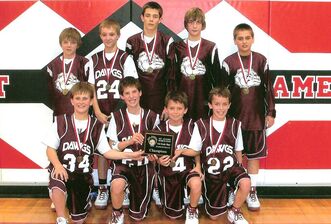Bridging Leadership Lessons from the Workplace and Those Experiences Shaping Today's Youth and Tomorrow's Leaders
 Originally Published: 9/1/2009 When I originally wrote this post in 2009, it was targeted to parents who were trying to determine if it was okay to play your child up a grade in sports. Now, driven by the power and hype of social media, the new trend is for parents to play their kids DOWN a grade! I will save that topic for a follow-up post. Having spent years coaching and leading a youth feeder program, I have watched players and teams come and go. Regardless of the year, there are always some talented players that need to be challenged at a higher level. While the off-season brings opportunity for high level travel teams, there is still a primary focus on developing within your community/school program that will lead to success in high school. In the smaller rural communities, you find the natural allegiance as you move from Elementary School to Junior High to a single High School. Where your current teammates will also be your future teammates. In the larger cities, there are typically options for which high school you will attend. Many schools don’t have a true Junior High team. So, the travel team is the priority and many times you see players transfer high schools to play with their travel ball teammates instead as in our smaller communities, where you are playing with your neighbors. Our programs focus on school ball and are driven for the success of the community. We are talking about the Out State Hoopers. The higher-level players will surely go play on travel teams once their school season is done which will provide additional challenges. But what about during the season? As parents we waiver between our desire to see our child be successful and our desire to protect. Is it better for them to struggle and play against older/stronger competition or for them to be successful against kids their own age? It is a tough question and made tougher when you, the parent, are also the coach. I have had first-hand experience with playing my child up with mixed success. In baseball, my oldest child was physically able to play at the same level but was not ready mentally - especially when you consider he was a summer birthday that did not stay back a year. The reality was that he was typically 1 to 2 years younger than the other kids and if the team played up a grade, he could be 3 years younger. In basketball, he was always a lower end player on the older team but gradually improved to earn more playing time but still not the top performer. When he finally played with a team made up of his own grade and against teams in his grade, he was able to find success. You could see the light turn on in his head as he was able to slow down the game and the work from playing with older kids allowed him to play at a different pace and with different skills than those in his age group. After that, he was able to translate success at that grade level back to playing on the older team as his confidence skyrocketed. There is another instance where a younger basketball player played with an older team and was their point guard and a dominant player at the older level. As the kids on that team moved on to school ball and played with only their grade, they found a huge gap in their team as they did not have a player ready to take over the point guard position. That could have a huge impact on a high school program as gaps exist as the sophomores thru seniors enter the same playing arena. So, when is it okay to play your child up? Well, it depends. It depends on the child; it depends on the child's team, and it depends on what you hope to gain. In our program, we follow the guidance of our High School coaches and their perspective on the child's development. Do they want them staying with their grade and helping to build chemistry and improve as a team? Or do they prefer this player to be challenged so that they can elevate their own game which will encourage others to raise their game to keep up? Below I have listed a series of pros and cons that hopefully you will consider when determining whether your child should play up a grade. Advantages to Playing Your Child Up
Challenges to Playing Your Child Up
Personally, it was not the right thing for him in baseball. It actually hampered his development. In basketball, I feel it helped my child's development initially, but he needed to have success and he was able to achieve that, by playing against his age group. Balancing his playing between the two different age groups worked well for his personal and athletic development. I updated this article at this time because travel basketball and baseball seasons are underway. Also, High School playoffs are nearing an end and for those seniors and their parents, it is tough to see this chapter in their life come to a close. As someone who has already seen three of their kids graduate and have watched countless teams wrap up their careers, it’s a great reminder for you newer parents who are smack dab in the middle of the chaos of youth sports, that this is just a blip in time. While such a big part of your world right now, you will look back and realize that it was an extremely small part of your life and your memory. Ultimately, it’s just a game. A game that prepares them for life, but a game, nonetheless. Enjoy your time and remember that the relationship between the parent and the child is much more important than their success on the court. It is that relationship that will make these memories so special Beyond Today.
1 Comment
3/9/2022 02:07:07 pm
Good article that provides lots of insight. This also applies to many opportunities in life. Challenging situations are often great opportunities to learn and grow.
Reply
Leave a Reply. |
AuthorTom Brown - a husband and a father who is simply trying to make a difference. Using my experience as a Manufacturing Executive to connect leadership from the boardroom to the hardwood to help teams grow and develop to make a difference in the lives of others. Archives
May 2024
Categories |
Proudly powered by Weebly

 RSS Feed
RSS Feed

